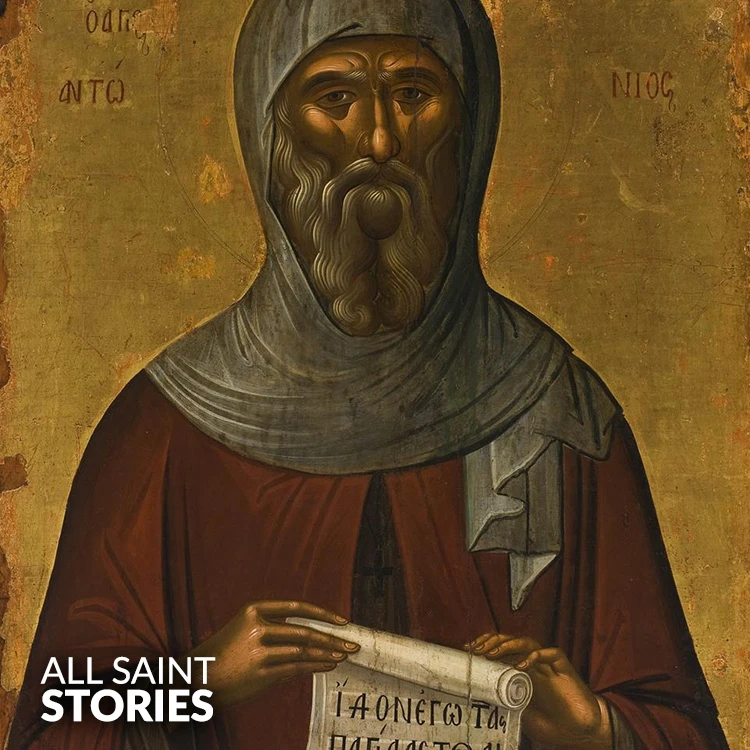"St. Anthony of Antioch, faithful servant of God, you were a light in the darkness and a guide to the faithful. Intercede for us, that we may live with courage, trusting in God's providence and love. Help us in our trials and lead us to a deeper faith in Christ. Amen."
ST. ANTHONY OF ANTIOCH
ST. ANTHONY OF ANTIOCH

St. Anthony of Antioch was an early Christian martyr who died during the Roman persecutions. He is venerated for his courage and steadfast faith, and his feast is celebrated on January 1st.
St. Anthony of Antioch lived during the turbulent times of the early 4th century when Christianity was still illegal under the Roman Empire. He is believed to have been born around 266 AD, likely in or near Antioch, one of the most important cities of the Roman East and an early center of Christian life.
During the reign of Emperor Diocletian, intense persecutions against Christians broke out across the empire. Anthony, a devout believer and possibly a deacon or priest, was known for his open profession of the Christian faith. He refused to sacrifice to the Roman gods or deny Christ, and for this, he was arrested and put on trial.
Despite facing brutal torture and the promise of release if he renounced his beliefs, Anthony remained unwavering. His courage and perseverance in the face of suffering inspired many of the faithful in Antioch and surrounding regions. It is believed that he was executed by beheading or another form of capital punishment commonly used against Christians at the time.
Though details of his life are sparse due to the lack of early written records, his memory was preserved in local tradition and Christian martyrologies. He is considered a martyr, a title given to those who die for their faith, and his feast day on January 1st reminds the Church of the cost of discipleship.
As with many early saints, St. Anthony of Antioch was canonized by popular acclaim, a process known as pre-congregation, meaning before the formal procedures of canonization were established by the Vatican. He is honored particularly in Eastern Christian traditions and regions historically tied to ancient Antioch.
Video Not Found
The information on this website is compiled from various trusted sources. While we aim for accuracy, some details may be incomplete or contain discrepancies.
If you notice any errors or have additional information about this saint, please use the form on the left to share your suggestions. Your input helps us improve and maintain reliable content for everyone.
All submissions are reviewed carefully, and your personal details will remain confidential. Thank you for contributing to the accuracy and value of this resource.
Credits & Acknowledgments
- Anudina Visudhar (Malayalam) – Life of Saints for Everyday
by Msgr. Thomas Moothedan, M.A., D.D. - Saint Companions for Each Day
by A. J. M. Mausolfe & J. K. Mausolfe - US Catholic (Faith in Real Life) – Informational articles
- Wikipedia – General reference content and images
- Anastpaul.com – Saint images and reflections
- Pravachaka Sabdam (Malayalam) – Saint-related content and insights
We sincerely thank these authors and platforms for their valuable contributions. If we have unintentionally missed any attribution, please notify us, and we will make the correction promptly.
If you have any suggestion about ST. ANTHONY OF ANTIOCH
Your suggestion will help improve the information about this saint. Your details will not be disclosed anywhere.
© 2026 Copyright @ www.allsaintstories.com




 English
English
 Italian
Italian
 French
French
 Spanish
Spanish
 Malayalam
Malayalam
 Russian
Russian
 Korean
Korean
 Sinhala
Sinhala
 Japanese
Japanese
 Arabic
Arabic
 Portuguese
Portuguese
 Bantu
Bantu
 Greek
Greek
 German
German
 Dutch
Dutch
 Filipino
Filipino